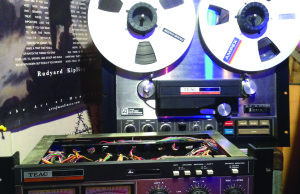WHAT TO WORRY ABOUT
Skip a lot of heartache and get a “modern” tape machine – something post 1975-ish (this varies depending on manufacturer) and that is a professional-grade machine. These will have all the features you need to make recordings, and were built to be repaired, aligned, and heavily used. They also tend to have a larger parts and tech support base. A good rule of thumb is if you can pick it up by yourself, it’s not a professional machine.
Get a machine that is in good working order. Don’t fall for “it worked the last time I used it” or “I’m not able to test it out” – these are red flags. If it works well, the seller will want to prove it to you, not skirt the issue. Once you buy a non-working machine, you’re faced with the task of getting it working properly, and the only way to figure out how much that will cost you is to…well…pay someone to get it working properly and pay the invoice.
Make sure the machine has all the pieces and parts it needs. Fixing machines is one thing, sourcing hard-to-find parts is another headache altogether. For instance, a lot of multi-track machines won’t even go into record without their remote, and are very hard to use without their autolocator. Finding these pieces is next to impossible because everyone with a machine has a locator, and they’re not likely to sell what they need.
WHAT NOT TO WORRY ABOUT
Head condition, head relapping or physical head alignment. WHAT? You heard me – yes, these things are important, but not initially. Think of it as getting new tires on a car that you’re not even sure will start or run. I talk to a lot of people who spend money on head relapping and haven’t even tested the machine out yet. Get the machine up and working, then worry about maximizing its performance.
Knowing how to align a tape machine. If you look online for advice about tape machines, you’ll see a lot of comments about things like oscilloscopes, fancy multimeters, signal generators, tentelometers, MRL tapes, etc. Yes, these things are also very important, but not right off the bat. Buy a good working machine, get a knowledgeable technician to go through it, and then focus on making good music with it. If you’re not within physical reach of a good tech, there are a lot of people (myself included) who will assist you via FaceTime or Skype on alignments. This is a fantastic idea because it helps you learn the steps as you’re doing it with guidance.
Who previously owned the machine or what records were done on it. Who cares? These are usually used to distract you to the pertinent facts, like does it work? All you should care about is if it’ll help you make your records.
So that’s my two cents on what to focus on when buying a machine. Once you get your machine, it’s a good idea to get new tape (I recommend ATR) and get it aligned by a professional, or with professional help. Once it’s aligned and working properly, leave it powered on as much as possible, and if you stick with the same tape formulation, you won’t need to align it very often at all. What you will have to do often is clean the heads, guides and metal rollers with isopropyl alcohol (above 90%), which you can get from most local drug stores or hardware stores. Be sure to get in all the crevasses because that’s where tape residue can build up and cause issues. Clean anything rubber with Formula 409 cleaner. Always consult a professional with solid, first-hand knowledge before doing anything you’re not comfortable doing, such as audio alignment, head alignment or any repairs, and you’ll be all set.
ABOUT THE AUTHOR
Chris Mara has been a recording engineer in Nashville since 1995. His all-analog recording studio, Welcome To 1979, has been operating in Nashville, TN for 7 years. Mara’s passion for analog recording led to the birth of his second company, Mara Machines- a company that specializes in restoring MCI tape machines. Restored Mara Machines are being used all over the world. For more, visit www.chrismara.com.

